| Background |
| Once I installed my winch, I realized that if I wanted to have extra convenience,
I would need to install something that would allow me to raise the idle speed to charge
the battery during and after winching. By raising the engine speed to somewhere
around 2000 r.p.m., the alternator will charge the battery if it needs it, and also
generate power during winching operations to reduce the load on the battery. While it might be possible to accomplish this by
simply holding one's foot on the gas pedal, it is not very convenient and in some
instances might not be possible. So before I found myself in a position to need such
a feature, I went ahead and tackled the problem. |
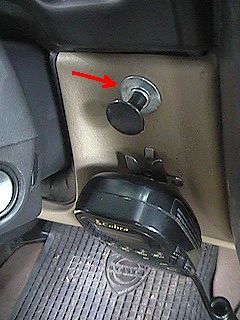 Throttle Conversion Kit shown installed to
the right of steering wheel
|
| The most common solution that I have found to this problem is the installation of
a bike shifter and cable that is mounted to the stick-shift lever and attached to the
throttle body. It is a nice solution and is popular for obvious reasons. The
parts are easy to locate, cheap to buy, and easy to install. However, I wanted
something a little more traditional, something that would look like it was there when the
vehicle was new. This led me to consider the use of a conventional dash knob, cable
and some sort of factory-original anchoring system for attaching the cable to the throttle
arm under the hood. |
| I went to
the dealership and took a look at a Jeep that had cruise control, figuring this would be
the most similar factory set-up like what I wanted to do. My solution was right
before my eyes: I would use the factory anchoring clip that holds the cruise control
cable to the throttle lever on the throttle body. I priced a cruise control cable
that includes the anchor, the only part I really need, and it was over $20. Not so
good... Then I took another look under the hood and noticed that the throttle return
spring uses the same anchor clip. I priced the throttle return spring and found that
it was under $3. Now we're talking turkey! |
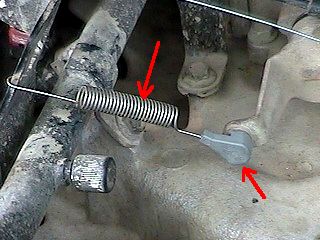
Throttle Return
Spring Assembly
|
There was one additional consideration that led me
to use the factory clip. When the gas pedal is pushed and the throttle lever moves,
anything that is attached to it will also need to move in some direction. I did not
want my remote throttle cable to resist every time my gas pedal was pushed (that is pretty
much the "normal" state of the device so that means all the time) and I didn't
want to risk it getting tangled up. |
| If you
examine the operation of the throttle lever on a vehicle with cruise control, you notice
that the cruise control cable "idles" when not in use. That is to say that
it remains stationary, in the rest position even when the gas pedal is pushed.
This is accomplished by the simple
arrangement of the cable retaining crimp and the anchor that is attached to the throttle
lever. When the gas is pushed, the cable simply slides through the anchor and stays
still. This is exactly how I wanted my remote throttle to work. |
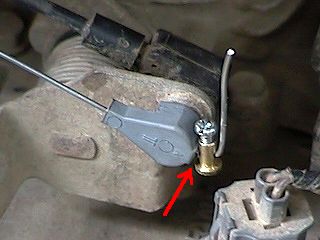
Gas Pedal Not
Pushed
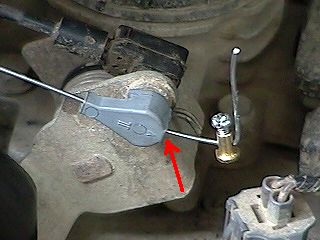
Gas Pedal Pushed
|

Throttle Return
Spring Assembly - discard spring (or use for something else) and use the gray clip
retainer
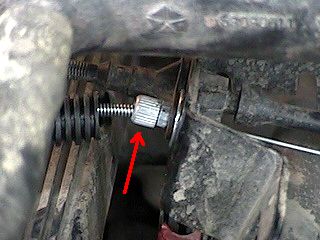
Bike brake or
shifter adjustable cable ferule shown mounted on bracket intended for cruise control cable |
The first thing you need to
do is get the parts. You will need a generic throttle cable like the one I got from
my local discount auto parts store. I used the "HELP" Throttle Conversion
Kit, made by MotorMite, part number 03787, and selling for less than $12. There are
other similar kits that will work, just as well as long as the cable fits through the
factory anchor. And the
cable anchor that attaches the cable to the throttle lever at the throttle body.
That is Mopar Part number 52078102-AB and is described as a "Throttle Return
Spring". The spring and clip come as one part for under $3. Beware that
the parts people are not going to be able to find this easily without the part number and
generally (in my experience with this part) will try to sell you the throttle or cruise
control cable. BRING THE PART NUMBER and just get that...
I also bought a cable ferule at a bike
repair counter at a full service bike shop. It is just a little piece of metal that
holds the cable housing onto a bracket (in this case the mounting point for the factory
cruise control cable) and has a hole for the cable to pass through. The one that I
bought has a nut to allow adjusting - I got an extra nut so that I could permanently
attach the ferule to the bracket. |
| Installation
is pretty easy. Remove the panel below the steering wheel by removing the two screws
on either side below the steering wheels. I moved my tilt-wheel up to make it a
little easier. The 1999 Wrangler has the headlight switch on this panel but it just
pushes through the hole provided and should not pose any problems - and does not have to
be disassembled. For later years, the light switch is on the column and is not an
issue. Once you have the
panel off, you want to examine the area on what is the upper-right corner, and look at the
area behind the panel. You are going to drill a hole that the cable passes through
and the knob mounts to.
I centered the hole directly above the
retaining screw and located it as close to the top of the panel as possible so that it
would not interfere with my CB bracket. I also made sure that the portion of the
cable assembly that bolts to the panel was clear of any under-dash wiring or cables. |
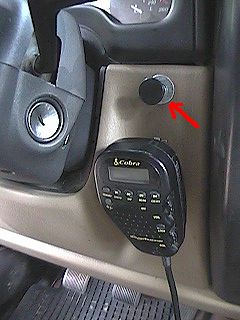 Throttle
Knob installed with flat washers for stability (both sides)
|
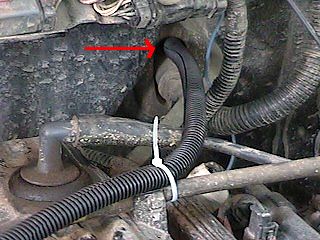
Cable (covered
with Wire Conduit added later) shown coming through firewall |
Before installing the cable,
I removed it from the casing, got rid of some minor kinks, and lubricated with
Lock-Ease, a liquid lubricant that has graphite in it. Once the liquid dries
out, the graphite stays behind and acts as a dry lubricant. I had great success with
this lubricant on my bike cables and expect it will work well here too. I drilled a hole that matched the size of the
cable assembly and inserted the cable into the panel. I passed the cable above part
of the wiring and other plumbing inside the dash, and down to the firewall plug that I
wanted to use, trying to get as straight a line as possible, and leaving some slack.
Sharp bends in the cable will damage it and prevent proper operation. I used
a washer on each side of the knob and attached the nut that holds the knob to the dash
panel.
I then threaded the other end of the
cable through the grommet in the firewall that is above the big round one near the gas
pedal, being careful that I did not cut any of the other items passing through. It
pretty much just pushed right through without any cutting and minimal force. The
cable comes out the other side, in the engine compartment, just about level with the top
of the engine. I put the dash panel back in place with the two screws. |
| I
installed the cable ferule onto the same bracket that holds the gas pedal cable end and
the cruise control (my Jeep does not have cruise control). I used some red Loc-Tite
to keep the ferule from getting loose.
I threaded the cable around and used the
gas pedal cable as one anchor point, and the factory clips (meant for the cruise control
cable) for another anchor point.
I threaded the end of the cable through
the hole in the ferule that I installed, and pulled it tight so that the cable casing was
firmly seated in the cable ferule.
I dressed the cable casing with 3/8"
Wire Conduit to make it look a little better, to retain the lubricant in the cable casing,
and to protect the cable casing from excess moisture. |
 Bike brake or shifter adjustable cable ferule
shown mounted on bracket intended for cruise control cable
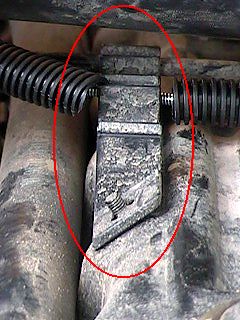
Cable secured by bracket used by
gas pedal cable and intended for use by cruise control cable |
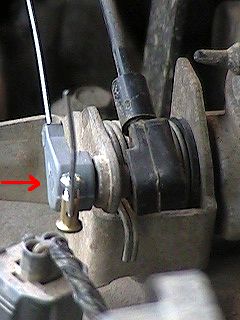 Throttle lever at Throttle Body with
Remote Throttle cable attached using factory clip
|
Next I threaded the cable
end through the factory anchor clip. Before doing so, I clipped the end of the
spring and removed it from the anchor clip. Once the cable was threaded through the
hole in the clip, I snapped the clip onto the throttle lever in the position shown (the
stud meant for the cruise control cable). Believe it or not, adjustment of the cable is dead easy. Once the cable is
mounted to the dash, and has been threaded into position as described above, you simple
put a cable retaining sleeve and nut on the end (provided with the Throttle Conversion
Kit), slide it all the way up to the throttle lever where the anchor clip is attached, and
tighten the screw on the cable retaining sleeve. I left a little play between the
retaining sleeve and the anchor clip so that the throttle lever would not be held
open. I bent the end of the cable past the end of the retaining sleeve so that the
bend would relieve the retaining sleeve from some of the burden of holding the cable.
(Anyone who has ever owned vehicles with SU Carburetors will know exactly what I
mean here...) I trimmed the extra cable off. |
| I did a
few tests with the vehicle turned off. I exercised the throttle lever to observe the
movement of all parts. As planned, the new remote throttle cable just slides through
the new anchor clip (as it would if it were the factory cruise control). The resting
point of the throttle lever occurs before the new cable retainer touches the new anchor
clip, assuring that the idle speed and position of the throttle switch are not modified
from normal position. When the new remote throttle knob is pulled, the throttle
lever moves as expected. I have designed this in such a way that the correct
operation is as follows: 1.
Locate desired RPM with gas pedal.
2. Pull out the remote throttle
knob until you feel resistance
3. Remove foot from gas pedal -
engine stays at chosen RPM.
To turn off the remote throttle, just
push it all the way in to the dash. |
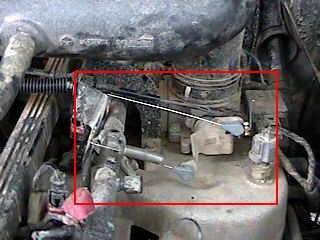
Finished linkage at Throttle Body |
| The throttle knob works well for me and accomplishes my stated goals. It is
not meant as a "hand throttle" and is not meant to be used to set an engine
speed for driving. In my experience, I have not had any trouble maintaining smooth
speeds with the use of the gas pedal. |

Visitors since 7/25/02